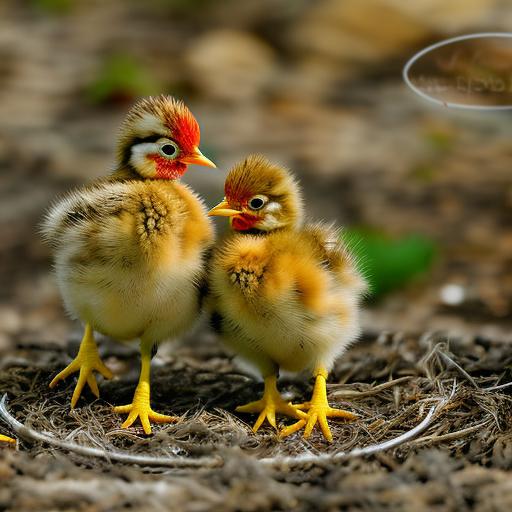Pecking behavior in baby chickens is a common occurrence that can be both fascinating and concerning for chicken owners. Understanding this behavior is crucial for ensuring the well-being and health of the flock. Pecking behavior can range from harmless pecks to aggressive pecking that can cause injuries and even death. By understanding the causes of pecking behavior and implementing preventive measures, chicken owners can create a harmonious and safe environment for their feathered friends.
Key Takeaways
- Pecking order is a natural behavior in chickens where they establish a hierarchy.
- Overcrowding, inadequate feeding and watering, boredom, and age and size differences can cause pecking behavior in baby chickens.
- Injuries and wounds should be treated immediately to prevent infection and further pecking.
- Providing enough space, food, water, and stimulation can prevent pecking behavior in baby chickens.
- Understanding and addressing the causes of pecking behavior can lead to a healthier and happier flock.
Understanding the Pecking Order
The pecking order is a social hierarchy that exists within chicken communities. It determines the rank and dominance of each individual in the flock. The pecking order is established through a series of pecks and displays of aggression, with the most dominant chicken at the top of the hierarchy and the least dominant at the bottom. This order is important for maintaining order and reducing conflict within the flock.
In baby chickens, the pecking order begins to develop at a young age. As they grow, they start to establish their place in the hierarchy through pecking and other aggressive behaviors. This process helps them learn social skills and understand their place in the flock. However, it can also lead to excessive pecking if not properly managed.
Causes of Pecking Behavior in Baby Chickens
There are several reasons why baby chickens may exhibit pecking behavior. Firstly, it is a natural behavior that helps them establish their place in the pecking order. However, if left unchecked, this behavior can become harmful and lead to injuries or even death.
Another cause of pecking behavior in baby chickens is overcrowding in the chicken coop. When chickens are crowded together in a small space, they may become stressed and frustrated, leading to increased aggression and pecking. It is important to provide enough space for each chicken to move around comfortably.
Inadequate feeding and watering can also contribute to pecking behavior. Hunger and thirst can cause chickens to become irritable and more likely to peck at each other. Ensuring that chickens have access to enough food and water is essential for preventing this behavior.
Overcrowding in the Chicken Coop
Overcrowding in the chicken coop is a common cause of pecking behavior in baby chickens. When chickens are crowded together, they may become stressed and frustrated, leading to increased aggression and pecking. It is important to provide enough space for each chicken to move around comfortably.
To prevent overcrowding, it is recommended to provide at least 4 square feet of space per chicken in the coop. This will allow them to move around freely and reduce the likelihood of aggressive behavior. Additionally, providing multiple feeding and watering stations can help prevent competition and reduce stress.
Regularly cleaning the coop and providing proper ventilation can also help prevent overcrowding. A clean and well-ventilated environment will promote good health and reduce stress among the flock.
Inadequate Feeding and Watering
Hunger and thirst can cause baby chickens to peck at each other. It is important to ensure that chickens have access to enough food and water to prevent this behavior.
Feeding baby chickens a balanced diet that meets their nutritional needs is essential for their health and well-being. A diet rich in protein, vitamins, and minerals will help keep them satisfied and reduce the likelihood of aggressive behavior. Providing multiple feeding stations can also help prevent competition and reduce stress.
Similarly, ensuring that chickens have access to clean and fresh water at all times is crucial. Dehydration can lead to irritability and increased aggression. Regularly checking water sources and cleaning them as needed will help keep chickens hydrated and content.
Boredom and Lack of Stimulation

Boredom can also lead to pecking behavior in baby chickens. Chickens are intelligent and curious animals that require mental stimulation and entertainment. Without proper stimulation, they may become bored and resort to pecking at each other.
Providing a stimulating environment for chickens can help prevent boredom and reduce pecking behavior. This can be done by providing toys, such as hanging treats or mirrors, for chickens to interact with. Additionally, allowing chickens to free-range in a safe and supervised area can provide them with opportunities for exploration and mental stimulation.
Age and Size Differences
Age and size differences can contribute to pecking behavior in baby chickens. Older and larger chickens may assert their dominance over younger and smaller ones through pecking and other aggressive behaviors. This can lead to injuries and stress among the flock.
Managing age and size differences in the flock is important for preventing pecking behavior. It is recommended to introduce new chickens gradually, allowing them to acclimate to each other over time. Providing separate areas or enclosures for younger or smaller chickens can also help protect them from aggression until they are able to hold their own.
Treating Injuries and Wounds
Injuries and wounds caused by pecking behavior should be treated promptly to prevent infections and promote healing. It is important to clean the wound with an antiseptic solution and apply a topical antibiotic ointment. If the wound is severe or does not heal, it is recommended to consult a veterinarian for further treatment.
Preventing infections is crucial for the well-being of the flock. Keeping the coop clean and providing proper ventilation will help reduce the risk of infections. Additionally, monitoring the flock closely for any signs of aggression or injuries will allow for early intervention and treatment.
Preventing Pecking Behavior in Baby Chickens
Preventing pecking behavior in baby chickens requires a multi-faceted approach. Firstly, providing enough space in the coop is crucial for reducing stress and aggression. Ensuring that each chicken has enough space to move around comfortably will help prevent overcrowding and pecking behavior.
Secondly, providing a balanced diet and access to clean and fresh water is essential for preventing hunger and thirst-induced aggression. Feeding a diet that meets the nutritional needs of baby chickens will help keep them satisfied and reduce the likelihood of pecking behavior.
Lastly, providing mental stimulation and entertainment for chickens is important for preventing boredom and reducing pecking behavior. Providing toys, allowing free-range time, and creating a stimulating environment will help keep chickens engaged and content.
Conclusion and Final Thoughts
Pecking behavior in baby chickens is a natural behavior that serves a purpose in establishing the pecking order. However, if left unchecked, it can become harmful and lead to injuries or even death. Understanding the causes of pecking behavior and implementing preventive measures is crucial for ensuring the well-being and health of the flock.
By providing enough space in the coop, ensuring adequate feeding and watering, and providing mental stimulation, chicken owners can create a harmonious and safe environment for their feathered friends. Regular monitoring of the flock and addressing any issues promptly will help prevent pecking behavior and promote a happy and healthy flock.
If you’re struggling with baby chickens pecking each other, it’s important to address the issue promptly to ensure their well-being. One possible solution is to provide them with a suitable diet that meets their nutritional needs. In this informative article on Poultry Wizard, you can learn about what to feed ducks and how it can contribute to their overall health and behavior. Understanding the right food for your ducks can help create a harmonious environment and reduce the chances of aggressive behavior. To find out more about feeding ducks, check out this helpful resource: https://poultrywizard.com/keeping-ducks/what-should-you-feed-ducks/.
FAQs
What is pecking in baby chickens?
Pecking is a natural behavior in chickens where they peck at each other. However, excessive pecking can lead to injuries and even death.
Why do baby chickens peck each other?
Baby chickens peck each other for various reasons such as establishing a pecking order, boredom, stress, overcrowding, and lack of food or water.
How can I prevent baby chickens from pecking each other?
To prevent baby chickens from pecking each other, provide them with enough space, food, and water. Also, provide them with toys and other forms of entertainment to prevent boredom.
What should I do if I notice baby chickens pecking each other excessively?
If you notice baby chickens pecking each other excessively, separate the injured chicken from the rest of the flock and treat the wound. Also, provide them with more space and monitor their behavior closely.
Can pecking in baby chickens be fatal?
Yes, excessive pecking in baby chickens can be fatal. It can lead to injuries, infections, and even death. Therefore, it is important to monitor their behavior closely and take necessary measures to prevent excessive pecking.
Meet Walter, the feathered-friend fanatic of Florida! Nestled in the sunshine state, Walter struts through life with his feathered companions, clucking his way to happiness. With a coop that’s fancier than a five-star hotel, he’s the Don Juan of the chicken world. When he’s not teaching his hens to do the cha-cha, you’ll find him in a heated debate with his prized rooster, Sir Clucks-a-Lot. Walter’s poultry passion is no yolk; he’s the sunny-side-up guy you never knew you needed in your flock of friends!







